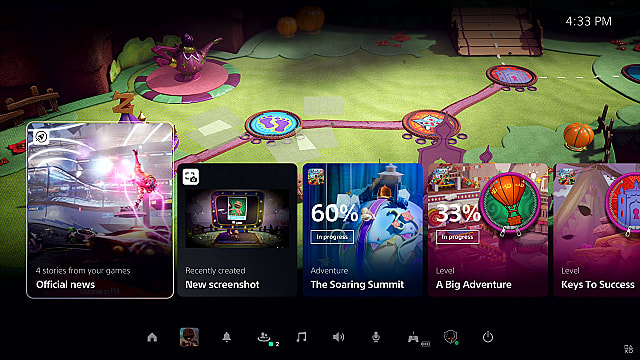Following a recent PS5 hardware breakdown, where it was confirmed that the size of the PS5 is mostly due to its heat-shredding fan and that the proprietary SSD is soldered into the system, Sony finally gave the world its first look at the PlayStation 5 UI.
Hideaki Nishino, Head of PlayStation’s Planning and Management Team, said that the “PS5 user experience was built from the ground up to take advantage of the console’s capabilities complementing the transformative games coming with this new generation.”
Aside from pressing the PS button to bring up the UI and the initial profile selection screen, the PS5’s UI is demonstrably different from the PlayStation 4’s UI, providing a much different UX when bringing it up while in-game.
Sony clarified that the showcase was “captured on a pre-production PS5 environment, so there may be a few small wrinkles or minor changes” in the final product. The system was booted up from rest mode, with Sackboy: A Big Adventure already running in the background. The home screen players will see when starting from a cold boot was also shown.
PlayStation 5 Cards
The first noticeable change between the PS5’s UI and the PS4’s UI is what Sony is calling “Cards.” These are part of the PlayStation 5’s Control Center, and they fulfill several functions. Some Cards allow users to pull up news and information on followed games. Others allow quick access to shareable media, such as screenshots and videos.
Activities
Activities, though, are the most notable part of the UI. These Cards display information about the in-game activities for the game currently being played on the PlayStation 5. Activities tell players how far along they are in a specific level or quest, for example, how much estimated time is left in the activity and any uncompleted objectives impacting completion percentage.
Sid Shuman, Senior Director of Global Content Communications at Sony, said that “some activities even let you jump directly to that place in the game.” He demonstrated this in Sackboy: A Big Adventure by jumping from the game’s overworld to an uncompleted level, made lightning-fast by the system’s SSD.
Game Help
Perhaps the most intriguing part of Activities is Game Help. Pulling up an Activity Card while in-game and then clicking on the uncompleted objectives of an Activity generates an in-game help video. This video provides “hints” on how to complete the current objective.
These cards can be put in picture-in-picture mode so that players can follow the video from beginning to end without pausing or interrupting the game. As of this writing, there’s no word on how many PS5 games will initially take advantage of this feature, though we do know that it is an option for developers and not mandatory.
In an interview with Eurogamer, Hideaki Nishino said that the videos are generated by the game’s metadata and implies that these could, theoretically, even be more contextual than what’s seen in Sackboy:
Parties
Starting a voice chat on the PS5 while in-game is similar to starting one on the PlayStation 4, except, just like every other UI and UX feature we’ve seen for the PlayStation, you don’t have to leave the game you’re playing to accept a chat invitation or join a party.
The other one is Official Game Help — so we can show the Official Game Help video when you are stuck in the game, you can bring up the cards, and you can watch it… So these are all from metadata coming out from the games and linking back to the associated data.
Share Screen is back, too, but this time, another player’s video can be watched in real-time. Sid Shuman shows how just like Game Help, videos can be viewed picture-in-picture and pinned anywhere on the screen. This lets you play your game while your friend plays theirs.
There’s a lot more in the video above, including how taking and sharing pictures has changed, how games and media apps have sleek, separate tabs, and how the PlayStation Store is integrated into the UI this time around. Be sure to check it out.
The PlayStation 5 is set to release on November 12 in the U.S. and select territories and November 19 worldwide.
[Sources: PlayStation Blog, Eurogamer]
